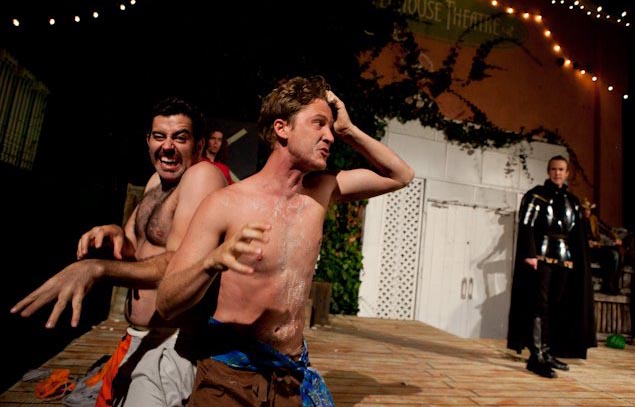Whether or not an audience member enjoys the comedies of William Shakespeare, the plays themselves haven’t changed in more than 400 years. It’s the director’s vision and his or her respect, or lack thereof, for the source material that shapes the production. For what may be their final performance as the main theater troupe of Santa Monica’s Powerhouse Theater, the Los Angeles Theater Ensemble is putting on a free production of Shakespeare’s “The Comedy of Errors.”
If a group of high school students, maybe very literate theater nerds with a knack for pulling sexual innuendos out of thin air, decided to get together in someone’s backyard and put on an unsupervised Shakespeare comedy, the experience would be something like this ensemble’s production.
Add the ensemble’s playfully modern and physical take on the source material and the play reaches a new level of absurdity. Couriers become cowboys with six shooters, sword fights involve black belts, and strangers fall in love with elaborate dance scenes.
When Antipholus of Syracuse (Mark Schroeder) ventures to the city of Ephesus with his slave Dromio (Cy Brown), he is soon mistaken for his long lost twin brother, Antipholus of Ephesus (Roger Stewart). Meanwhile, Dromio of Syracuse is mistaken for his own long lost twin brother, Dromio of Ephesus (Jesse Sharp).
As the city’s residents, including Antipholus of Ephesus’ wife Adriana, played by UCLA alumna Caity Engler, mistake one for the other, sword fights, exorcisms and happy endings ensue.
Beyond director Drew Shirley’s interpretation, the great performances of Engler, Schroeder, Stewart, Brown and Sharp are reason enough to see this production. There is something about watching an actor expertly rattle off Shakespearean dialogue as comfortably as he or she would modern English that is always enjoyable to watch.
Engler, as the jealous wife of the Ephesian Antipholus, is over-the-top, loud, aggressive and a little bit ghetto, while the Antipholus and Dromio pairs play off their respective bromances with physical and verbal eagerness. In both cases the actors never hold back ““ even when they should ““ and it works.
It’s all very fun, in a way that wouldn’t be possible in a large theater. The deck of the Powerhouse Theatre, the ensemble’s current home, is outdoors and only seats 50 people. It seems less like a playhouse and more like a casual gathering of friends. Being a part of that casual atmosphere makes the 20th-century revisions (Hulk gloves, modern pop songs on the soundtrack and additions of “Right …” to the dialogue) fit for the most part. It’s only during the second half of the play that the goofiness goes too far; one might not be sure whether the cowboy is funny or obnoxious.
In the play’s final scene, it returns to form, though it never achieves the right balance of modern-meets-classical humor it had in the first half. At the same time, the production never crosses the fine line between silliness and stupidity, sitting safely in the happy place between.
Email John at ajohn@media.ucla.edu.
